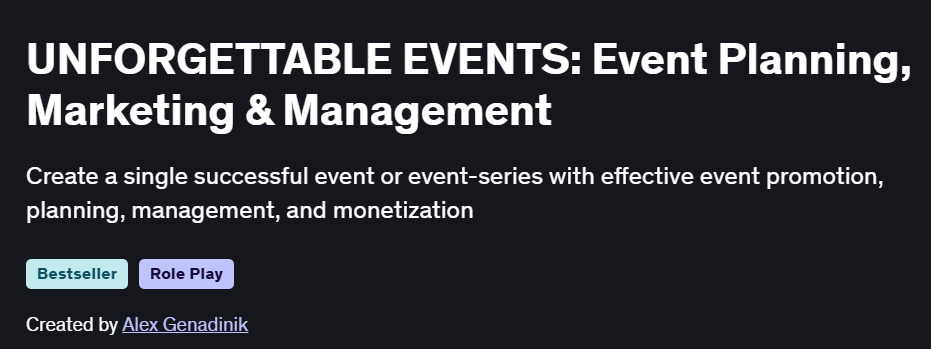What will you learn in UNFORGETTABLE EVENTS: Event Planning, Marketing & Management Course
Learn how to build, market, and scale a successful recurring event series
Understand key principles of event branding, planning, and audience engagement
Gain skills in budgeting, partnerships, and team coordination
Explore both in-person and virtual event strategies
Develop long-term growth tactics and data-driven event optimization
Program Overview
Module 1: Event Series Foundations
⏳ 1 week
Topics: Event series vs. single events, target audience, event goals
Hands-on: Define your event series concept and mission statement
Module 2: Branding & Positioning
⏳ 1 week
Topics: Naming, visual identity, brand consistency, storytelling
Hands-on: Create a mood board and branding guide for your event
Module 3: Promotion & Marketing Strategy
⏳ 1 week
Topics: Email marketing, social media strategy, landing pages, influencers
Hands-on: Build a promotional timeline and design your first marketing assets
Module 4: Monetization, Sponsors & Partnerships
⏳ 1 week
Topics: Budgeting, ticketing models, sponsor outreach, affiliate programs
Hands-on: Draft a sponsor pitch deck and sample budget sheet
Module 5: Logistics, Planning & Execution
⏳ 1 week
Topics: Venue selection, team roles, virtual event tools, contingency plans
Hands-on: Build an event checklist and assign tasks for your event day
Module 6: Measuring Success & Scaling
⏳ 1 week
Topics: KPIs, feedback loops, CRM tracking, long-term growth
Hands-on: Analyze past event data and outline a scale-up plan
Get certificate
Job Outlook
Event marketing skills are in high demand across industries like tech, media, and hospitality
Common roles: Event Manager, Marketing Specialist, Community Manager
Freelance and agency work is booming with the rise of hybrid and virtual events
Salaries range from $50,000 to $100,000+ depending on scope and experience
Specification: UNFORGETTABLE EVENTS: Event Planning, Marketing & Management Course
|
FAQs
- Explains strategies for balancing online and in-person participation.
- Provides guidance on tools for live streaming and virtual engagement.
- Teaches audience segmentation to tailor experiences across formats.
- Offers checklists to manage logistics for both event types simultaneously.
- Encourages data-driven adjustments for hybrid success.
- Teaches identifying potential sponsors and partners.
- Provides strategies for crafting effective sponsor pitch decks.
- Covers negotiating terms and creating mutually beneficial deals.
- Offers templates for sponsorship proposals.
- Includes budgeting practices to allocate funds efficiently.
- Covers audience analysis and corporate branding considerations.
- Teaches professional communication with stakeholders and vendors.
- Explains scheduling, team coordination, and contingency planning.
- Offers tips for maintaining professionalism while maximizing engagement.
- Provides examples of successful corporate event strategies.
- Explains key metrics and KPIs to measure event success.
- Teaches gathering feedback and using surveys for insights.
- Covers CRM tracking to monitor attendee engagement.
- Provides techniques for iterative improvement of recurring events.
- Guides learners in scaling events strategically over time.
- Structured for beginners, starting from foundational concepts.
- Explains each phase of event planning in simple, actionable steps.
- Provides templates, checklists, and hands-on exercises.
- Covers both virtual and in-person event considerations.
- Encourages learners to build confidence through practical projects.




![SEO For WordPress [Beginners]: #1 Step-by-Step SEO System](https://course.careers/wp-content/uploads/2025/06/SEO-Strategy-2025.-SEO-training-to-Unleash-Career-Potential-1-299x111.webp)
